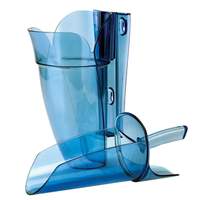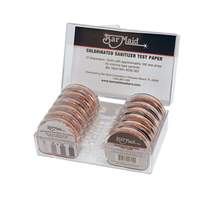Even though September is National Food Safety Month, safety is and should be priority number one all year round. Proper food safety protects your customers, employees, and your business’s reputation, so it is very important to ensure that your operation is adequately equipped.
There are four primary areas of food safety awareness – cross contamination, food handling, temperature, and cleaning and sanitation. Each of these is integral in creating a safe environment that will pass a health inspection and keep food safe. Here are a few items that can help make your kitchen a safer place.
Reduce the Chance of Cross-contamination
Vacuum sealers
Vacuum sealers add shelf life to product by providing an anaerobic environment, but they also help eliminate the possibility of cross contamination. Any and all contaminating agents are locked inside of the vacuum sealed plastic, and stay there until the package is opened.
Coded cutting boards & utensils
Using color coded utensils and cutting boards is one of the easiest ways to cut down cross-contamination in the commercial environment. By mandating yellow pieces be used for poultry, blue for fish, etc., kitchen managers can reduce food’s exposure to contaminating agents. Additionally, elevated cutting boards reduce the chances of cross-contamination through contact with work tables, and are becoming increasingly popular in the commercial environment.
Allergen kits
A variation of color coded smallwares, allergen kits are always purple. Most kitchens create arbitrary color codes that work best in their operation, however purple has become the industry standard for allergen free. Even the smallest contact with the wrong food product could spell disaster for someone with food allergies, and to combat that, manufacturers and industry workers have ubiquitously adopted purple as the color of choice. There are a number of manufacturers that sell entire smallware sets which are specifically designed to be used when an allergen free meal is requested.
Food Handling
Storage solutions
Ingredient specific containers can prevent cross contamination, ensure proper drainage, in addition to their commonly accepted tasks of monitoring inventory and keeping food fresh.
Date and ingredient specific labeling solutions
FIFO (first in first out) is one of the most important mantras in foodservice. Improper food storage is one of the largest causes of food safety violations. Day dots are a simple and easy to follow solution to identify products and their origin date.
Glove dispensers
Gloves are a necessity in every commercial kitchen, but leaving them in a cardboard box on a counter could lead to trouble. Unshielded gloves can be compromised by bacteria or food allergens, so it is best to keep them in a safe and clean spot.
Ice solutions
Ice is food, and must be treated like food. Ice scoops with hand guards and hanging ice buckets are starting to become mandated in many localities to prevent contaminating beverages, so it is essential that business owners take note.
Temperature
Thermometers
One of the three top food safety problems is the failure to follow proper temperature parameters. It is important kitchen managers make sure that foods are served at proper temperatures, but also maintain proper temperatures when being heated, held, and stored. Having the proper style thermometers available allows staff to monitor the safety of their product every step of the way.
Rapid cool wands
A simple and affordable solution for quickly dropping the temperature of soups, stews, and stocks, rapid cool wands are becoming more commonplace in the commercial environment. Filled with water and then frozen, these wands can be used in some instances to save restaurateurs from purchasing more expensive pieces, such as blast chillers.
Cleaning & sanitation
Test strips
Chlorine and quaternary sanitizer test strips ensure that sanitizing solutions being used are at proper concentrations; preventing under-concentrated solutions from leaving work surfaces unsanitary.
Cleaning and sanitizer buckets
Task or station specific cleaning and sanitizing buckets are must haves. Not only are they mandated in most areas, they are time savers. Having a proper cleaning and sanitizing solutions on hand helps keep work stations safe, and reduce the number of trips employees are making to keep their work station clean.
Booster heaters
Depending on how your operation’s dishwashing station is set up, and the volume of dishes being cleaned, a booster heater may be necessary to keep water at proper sanitizing temperatures.



